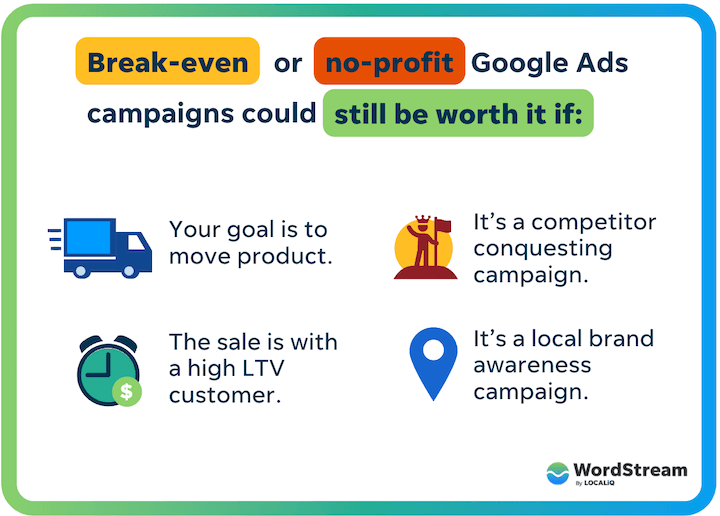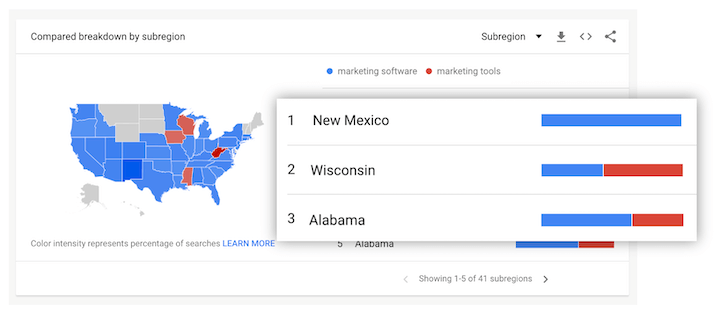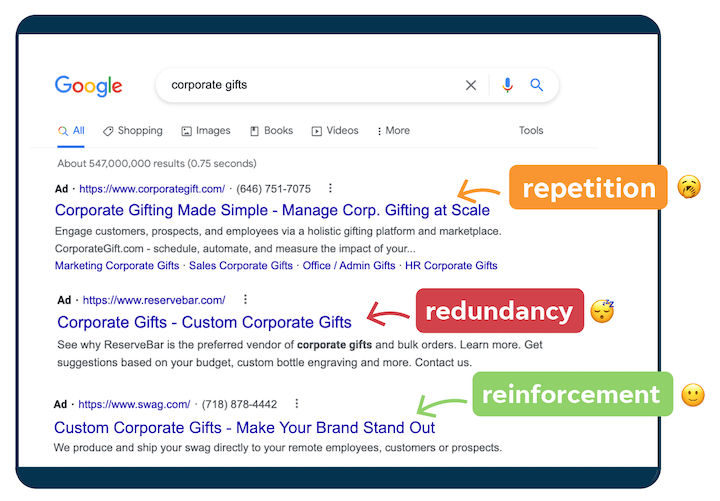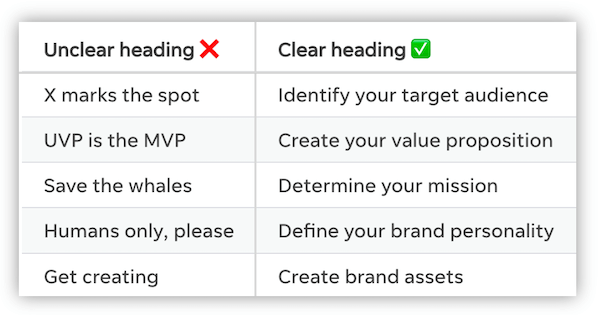
We publish a LOT of content. And if you’ve been following us for any amount of time, you’ll know that we strive to provide tips and insights that you don’t find in just any old blog.
Two problems though:
- Google is designed to surface information that people know to look for, and
- People are designed to skim.

The result? A lot of our truly best tips—the small nuances, side notes, and pro pointers that make a big difference—fall under the radar. So we’ve compiled our best tips of the year that you may have missed, but simply can’t afford to if you want to succeed in 2023. They just may be game-changers for your business!
Table of contents
Jump to the best of the best in…
Our premium PPC pointers
These pointers are primarily focused on search and social, with some video and remarketing campaign gems sprinkled in there too.
Google Ads
- To target your competitor audiences without breaking the bank, we shared some great lower-cost alternatives to competitor keyword targeting on search, including Quora ads by topic or interest, Linkedin Member Groups, Twitter follower lookalikes, Reddit communities, and YouTube search results. Go to post.
- To save money in Google ads, stick with city/neighborhood targeting. Zip codes are great in theory, but ad platforms can sometimes have a hard time determining them. The former can give you a better reach. Go to post.
- Break-even or no-profit Google Ads campaigns could still be worth it if your goal is to move product, if it’s a competitor conquesting campaign, it’s a sale with a high LTV customer, or it’s a local brand awareness campaign. Go to post.

- Responsive search ads are not a replacement for ad copy testing. You should still be routinely testing your ad copy with 2-4 active variants in each ad group. Each month, pause the underperforming one and replace it with a new variant. Go to post.
- Watch out for duplicate imagery in PMax! If you connect your Google Merchant Center feed to a Performance Max campaign, then you don’t need to add product images as separate image assets. Instead, add lifestyle images of real people using/wearing the product. Go to post.
Facebook ads
- Consolidating your Facebook conversion actions can save you a ton of time. Not for the sake of Aggregated Event Measurement, but because this can allow you to get conversion counts in the campaign-level view and make account-wide decisions much faster. Go to post.

- Super creative Facebook targeting hack: Bummed out by the restrictions on targeting based on employment, real estate, and finance targeting? Use in-market audiences on Google, which still offer this kind of targeting, to get traffic to your site that you can use as a source audience for a Facebook lookalike campaign. Go to post.
- The most reliable and efficient way to scale your Facebook ad budget is through cost per result goal bidding (formerly cost cap). Try out several bids with CBO (Campaign Budget Optimization) turned on and a minimum spend on each ad set. Facebook will automatically test various bids across different ranges, so you’ll be able to easily identify and scale up your most successful tactics. Go to post.
- Be smart with your lookalike audiences. The pixel can’t track all of your website visitors, so a customer or email subscriber list as a seed list is your best bet. If you do use a website page, use a high-intent page like
More PPC
- The one CTA per landing page may not be the best practice for your business. Don’t discount secondary conversion actions on some of your high intent landing pages—like an email signup, or a calculator tool. They may not be the conversion goal you want, but they may capture users you can retarget. Go to post.
- Don’t prematurely pause your remarketing campaigns. Yes, your audience needs to be at least 1000 people, but if you’re using a customer list as a seed for a Lookalike or Similar Audience, it can take up to 48 hours to process and you’ll get a “too small to serve” until it fully renders. Go to post.
- Video campaigns have some fine print you need to be aware of. For example, if you’re researching GDN websites to place your Video campaign on, know that Google will show you every site in the GDN, not just the ones with video ad placements. So check those sites before adding them to avoid wasted spend. Go to post.
The cream of our copywriting crop
Our template and example posts are always big hits, but you may have missed some of these finer details when browsing:
- There are more than seven power words. Yes, words like “you,” “free,” and “because” are the classic power words but don’t discount the power of using alternatives to “ultimate,” “boost,” and “innovative.” Try out these 350 interesting words and phrases that will make you stand out.
- Use Google Trends to capture nuances in your ad copy. Take “marketing tools” vs “marketing software,” for example. In Wisconsin there is more of a disposition toward tools, while in Alabama it’s software. This can make a world of difference in your click-through rates and campaigns. Go to post.

- To keep your blog readers hooked, use bucket brigades throughout your posts. This is a fancy term for conversational bridge phrases between paragraphs like “truth is…” “Here’s what I mean:” and “But that’s not all.” Just don’t overdo it and remember that your post should still be skimmable. Go to post.
- Avoid obvious or framing questions at the start of your business and social profile descriptions, blurbs, and other elevator pitch material—like “Are you looking to get more customers?” or “Need an all-in-one platform that will help you manage subscription invoicing? Be creative. Your goal is to capture attention here, not sneak in features or benefits. Go to post.
- Know the 3 Rs with your PPC ad copy: Reiterate and reinforce but don’t be redundant. Yes, relevance to keyword is important for Quality Score. But once in your headline, display path, and/or description is enough. Use the rest of the space for features, benefits, or related keywords. Go to post.

Our best website & SEO savvy
We’re always working on our own SEO as we help you to improve yours. Here are some tidbits you may have missed:
- You have to be a little boring sometimes to rank higher on Google. This means using clear titles and headings over creative ones. This especially helps Google to build custom meta descriptions that improve your click appeal in the SERP. But don’t worry, you can use more fun wording when you repurpose those posts into guides and social posts. Go to the post.

- Compressed images could still drag down page speed if they’re unnecessarily wide. If you use sidebars in your blog layout, find out the maximum width of the content section and make sure your images don’t exceed that. You can save a few trips to the server and improve your on-page SEO. Go to post.
- Your target audience for content shouldn’t just be potential customers. You need to add potential amplifiers as a persona. These include industry publications and influencers who will share your content with their audiences on social and link to it in their blog posts. This is key to getting a meaningful lift in relevant (potential customer!) traffic to your site, especially for niche content that may not be as keyword-targeted. Go to post.
- To improve your SEO through internal link building, strive to make any page on your site no more than three clicks away from your homepage. Make sure that in addition to anchor text, you’re optimizing your navigation menus, footers, sidebars, and pillar pages. Go to post.
- Prioritizing accessibility will also help with your SEO and CRO, so make sure it’s a part of your website audit. Check for HTML tags, clear and descriptive anchor text, image alt text, and easy-to-use forms. Go to post.
And that’s a wrap!
We, of course, write on more than just the above categories, but SEO, PPC, and copywriting are reader favorites so we stuck with those in order to cover the best of the best. Check out our blog homepage to view more categories including social media, reporting and analysis, conversion rates, landing pages, industry news, and more!
Now over to you—any tips that stuck out to you that you think deserve to be in this roundup? Let us know in the comments! And stay tuned for plenty more where that came from in 2023!







